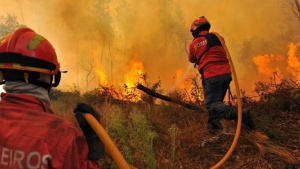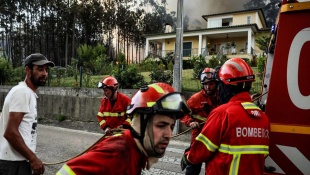We are once again in the critical period of forest fires. In the next two months, as the last few weeks have already signalled, we run the serious risk of seeing rural and forester owners losing parts of their farms, populations in distress seeing the fires approach, hundreds of fire-fighters and other civil protection operatives risking their life to fight fires and to protect people and property.
This summer, three years after the great fires of June and October 2017, we are basically in the same conditions when we faced them then, after the great fires of 2003 and 2005 and after all the recommendations adopted in the Assembly of the Republic.
Three years in which, besides this or that limited progress, we heard all the projects, all the reforms were presented, including the biggest reform since the time of D. Dinis, all the announcements were made, with dozens of legislative pieces being published without, however, addressing fundamental problems and even allowing some of them to deteriorate.
When, following the aforementioned fires, we saw a legislative fury by the government, the PCP warned that what was lacking were not laws, but to comply with the National Forestry Strategy, the Basic Law of the Forest, the Law of the System of Defence of the Forest against Fires, the guidelines defined in the PROF [Regional Programme of Forest Planning] and in the National Forest Inventory.
We warned that what were needed were not more rules and bureaucracies, but human, material and financial means. We stated at the time that it would be necessary to break with the policy that PSD and CDS had imposed, even cutting 150 million euros in investments in the Forest and helping the materialisation of the plunder of land from small landowners in order to hand them and concentrate on large economic groups or investment funds.
After these years, it is time to take stock and ask for accountability. Let us not wait for new large-scale fires.
The PCP signalled as a central issue for the active management of the forest, the valorisation of the price of wood, proposing a set of measures that were rejected in the Assembly of the Republic, including the publication of a portal with the prices of wood. Not even this was accepted, in a clear concession to the great interests of the economic groups of the pulp and paper, pine and cork pellets industry.
The PCP denounced and helped adopt the creation of teams of Forest Sappers, to achieve the goal of 500 teams around the country. Three years later, the last report refers to the existence of 375 and the only thing the government did, besides the creation of a little more than two dozen teams, was jiggle the numbers, confusing different types of teams to justify their inoperativeness.
The PCP tabled and helped adopt the re-establishment of the Forest Guard Corps. This summer, despite the fact that two and a half years have passed, despite the beginning of the training of agents, this body, which PS, PSD and CDS decided to destroy, will not yet give the contribution that would be necessary.
The PCP defended, in the amendments to the Legal Regime for Forestation and Reforestation, measures to contain the spread of monocultures, particularly eucalyptus and what we are witnessing is the uncontrolled proliferation of this species, without ensuring compliance with the law, namely with regard to respect the reduction of the eucalyptus area provided for in the National Forest Inventory, or taken measures to control natural regeneration.
The PCP defended the establishment of a de facto Forest Registry, with the constitution of teams on the ground to guarantee its execution, in order to truly know our forest structure. Instead, the government preferred to insist on the thesis of looking for lands without a known owner, with a kind of Registry, which it is unable to complete and now wants to pass on to the municipalities. To this day, we continue to ask how many lands without a known owner have been registered. To date, we have found no answers.
The PCP assumed the defence of the Common Lands, contributing to the adoption of a new law, and demanded support for their activity, respecting their autonomy. The government's option has been to create difficulties in the transition of the Common Lands to self-management and to impose, now, new rules with assorted legislation, namely regarding the management of protected areas, without listening to the bodies of the Common Lands, or the local authorities.
The PCP defended a policy of forest planning with a focus on native forest species, with the creation of primary fuel management bands, with the use, in winter, of controlled fire. The government chose to persecute small landowners, multiplying fines, while at the same time not reforesting, for example, the areas under its responsibility, as is the case of the Pine Forest of Leiria, despite the almost 15 million euros of revenue from the sale of burnt wood.
The PCP stressed that the defence of the forest requires the promotion of family farming, guaranteeing the flow of production at fair prices and, in addition, demands a public investment policy, capable of guaranteeing job creation and the settlement of populations, and the strengthening of public services and State responses to its social functions. Instead, the Government has insisted on the termination of services and the discrimination against small and medium-sized agriculture.
The PCP has denounced the difficulties experienced by the Volunteer Fire-fighters corporations, which are a fundamental basis for fighting fires, whether due to the delay in payments for the services provided, or due to the difficulty in attracting volunteers, in a context of marked depopulation. The government maintains very significant delays in payments, leaving some corporations in severe difficulties even to face current expenses, in addition to those resulting from the exceptional situation we are experiencing. It is therefore demanded that the government immediately implement the increase of funds proposed by the PCP and adopted in the Supplementary Budget.
The PCP has always fought for preferential support for small and medium-size producers. This was not the option of the PS, as it was recently made public when it was learned that almost a third of the programme to compensate owners who wanted to replace eucalyptus with native species goes to the Amorim group company that owns Herdade da Baliza, in the Natural Park of International Tagus. At the same time, the PS government reduced the support rates in the PDR 2020 for the forestry sector (except for the installation of irrigated eucalyptus trees), which contributed to the low rate of implementation of this Programme in the sector, and mainly penalises the access of small and medium-size forest producers to investment projects in the forest and the inherent public financial support.
The PCP drew attention, and even managed to approve funds for that purpose in the State Budget, to the need to fill the shortage by hiring workers for the ICNF [Institute for the Conservation of Nature and Forest], to reinforce this structure that assumes the functions of National Forest Authority. The figures that are known in the meantime indicate that progress is still lagging in this area, preventing the fulfilment of its functions and, in particular, support for small forest producers.
The PCP has always demanded an integrated agro-forestry vision, corresponding to the national reality. The PS government chose to separate the forest area from agriculture, introducing more confusion and difficulties for small producers, not understanding the dynamics of national agriculture with all its agricultural, livestock, and forestry dimension, in which working times, agricultural practices and incomes complement each other, and putting policies with their backs against each other, which will inevitably lead to reduced incomes and the abandonment of new areas.
After so many announcements and so much propaganda, the problems remain, when they have not worsened. This is the time to act in means of prevention and surveillance that ensure immediate responses, a matter on which we will hold, on July 17, a public hearing with fire-fighters’ bodies.
But it is mainly the time to, while defending small and medium-size forest producers, complying with the Basic Law of the Forest and the Law of Defence of the Forest against Fires, to assume a different, patriotic and left-wing policy, defending the forest and the rural world and preventing fires.


